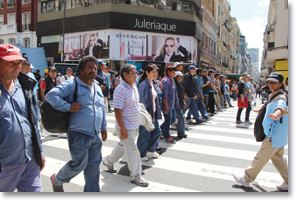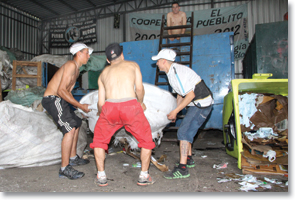|
Sustainability and Exclusion by Nic Paget-Clarke Buenos Aires, Argentina
In October of this year, I visited the Southern Cone of South America, specifically Argentina, Uruguay, and Chile. I went as part of an ongoing search to understand just what sustainability is. How can humans survive on Earth? Is life sustainable? Within minutes of landing at the Buenos Aires airport, I was heading into this thirteen-million-person metropolis and chatting with the taxi driver. I asked him about the “villas”. His assessment was there are four large villas (or barrios) around Buenos Aires with a population of about two million. I learned as the days slipped by that the people in these villas are “excluidos” -- excluded from society. The next day, I walked downtown by the Presidential Palace – The Pink House and the Plaza de Mayo. I stared at skyscrapers and gazed at huge government buildings, at remnants of the Spanish colonizers, the English invaders -- even the statue of Columbus which President Cristina Fernández de Kirchner has had disassembled in preparation for relocation. I stopped and listened to a reggae jazz band. I walked down the tourist-targeted Florida alley. I stumbled onto lines of ambling riot police. To my left, down one of Buenos Aires’ main avenues, came a march, a family outing of excluidos. From one side of the street to the other, with a Givenchy perfume billboard as a backdrop, came bright blue banners, barrio identification, images of Che!, rhyming drums -- came excluidos. I’m told that a large percentage of the excluidos are migrants from the Argentine countryside, from Paraguay, from Bolivia, even Chile. They are peasants. They are Indigenous people. They are people in general. They come because their land is no longer theirs; they have no income; they can’t survive. They are drawn to this huge metropolis in search of survival. Just like people come to the United States. I joined the march, took photos, had short chats. I had a people-guided tour of downtown Buenos Aires. A couple of hours later, I was in the offices of CTEP in the Constitución neighborhood. CTEP is the Confederación de Trabajadores de la Economía Popular -- the Confederation of Workers of the People’s Economy. When you have been excluded from society, you have to create your own society, with your own culture and economy. CTEP, organized without hierarchy and based on horizontal relationships, makes it decisions in networks of community assemblies in the villas of Buenos Aires and throughout Argentina. They create cooperatives and small enterprises to create and share products and income. They work with the movement of recuperated factories in Argentina which are owned and run by their workers. They grow vegetables and raise animals without landlords. They collect used materials and recycle them. As artists they make clothing, pots, all sorts of things, and sell them on blankets in the streets, at fairs and markets. They wash windscreens at traffic lights. They deliver messages and items on motorbikes. But what does it mean to be excluded? Excluded by who and from what? CTEP has realized that the world economy, the world culture is no longer simply about exploiting people -- whether they be wage workers, farmers or peasants -- and concentrating that wealth, that land, those mines, that capital in the hands of fewer and fewer investors and corporate owners. According to their analysis, those who are privatizing the Earth have such wealth, such power, and such access to technology that they simply don’t need all of us people to sustain their system of depredation. They have written off millions. There is no rational economic reason to continue to include them. And this view of sustainability demands exclusion. I’ve never quoted a Pope before, but the new Pope Francis who is from Buenos Aires puts it this way: “Just as the commandment 'Thou shalt not kill' sets a clear limit in order to safeguard the value of human life, today we also have to say “thou shalt not” to an economy of exclusion and inequality. Such an economy kills. How can it be that it is not a news item when an elderly homeless person dies of exposure, but it is news when the stock market loses two points? This is a case of exclusion. Can we continue to stand by when food is thrown away while people are starving? This is a case of inequality. Today everything comes under the laws of competition and the survival of the fittest, where the powerful feed upon the powerless. As a consequence, masses of people find themselves excluded and marginalized: without work, without possibilities, without any means of escape. “Human beings are themselves considered consumer goods to be used and then discarded. We have created a 'throw away' culture which is now spreading. It is no longer simply about exploitation and oppression, but something new. Exclusion ultimately has to do with what it means to be a part of the society in which we live; those excluded are no longer society’s underside or its fringes or its disenfranchised – they are no longer even a part of it. The excluded are not the 'exploited' but the outcast, the 'leftovers'.” We have exclusion and it can certainly be sustained. Additionally, there are those who need exclusion for their own sustainability. So, yes, sustainability can exclude. At the same time, though, if we want to, we can listen to and learn from those who seek balance and inclusion -- and sustain that. Nic Paget-Clarke is publisher and a co-editor of In Motion Magazine and author of ... and the echo follows (facebook.com/AndTheEchoFollows)” Published in In Motion Magazine January 6, 2015. Also see:
|
||||||||
If you have any thoughts on this or would like to contribute to an ongoing discussion in the  What is New? || Affirmative Action || Art Changes || Autonomy: Chiapas - California || Community Images || Education Rights || E-mail, Opinions and Discussion || En español || Essays from Ireland || Global Eyes || Healthcare || Human Rights/Civil Rights || Piri Thomas || Photo of the Week || QA: Interviews || Region || Rural America || Search || Donate || To be notified of new articles || Survey || In Motion Magazine's Store || In Motion Magazine Staff || In Unity Book of Photos || Links Around The World NPC Productions Copyright © 1995-2015 NPC Productions as a compilation. All Rights Reserved. |



